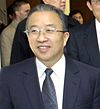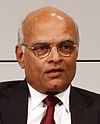Special Representative mechanism on the India-China boundary question

The Special Representative mechanism on the India-China boundary question (SR/SRM) was constituted in 2003 to "explore from the political perspective of the overall bilateral relationship the framework of a boundary settlement". Atal Bihari Vajpayee, in the capacity of Minister of External Affairs of India, had first suggested the SR mechanism during his visit to China in 1979.[1] During another visit to China by Vajpayee, this time in the capacity of Prime Minister, in June 2003, the mechanism was mentioned in an agreement between the two countries. The latest mention of the SR mechanism was in a Joint Press Statement between India and China on 10 September 2020.[2][3]
During the 4th round of talks in 2004, Dai Bingguo suggested that the SR mechanism follow a 3 step formula for the settlement of the India-China boundary question:[2]
- Establish the political parameters and guiding principles
- Establish the framework for a final package settlement
- Delineate and demarcate the boundary
The first step was completed with the Agreement on the Political Parameters and Guiding Principles for the Settlement of the India-China Boundary Question being signed in 2005.[2] The second phase of negotiations began with the sixth round of talks.[4]
During the 15th round of the SR talks in 2012, the Working Mechanism for Consultation and Coordination was set up.[5]


Rounds of talks
- 23–24 October 2003[2]
- 12–13 January 2004[2]
- 28 July 2004[6]
- 18–19 November 2004[2]
- 10–11 April 2005[2]
- 24–28 September 2005[2]
- 11–14 March 2006[2]
- 24–28 June 2006[2]
- 17–18 January 2007[2]
- 20–22 April 2007[2]
- September 2007[2]
- September 2008[2]
- 7–8 August 2009[2]
- 29–30 November 2010[2]
- 16–17 January 2012[2]
- 28–29 June 2013[7]
- 10-11 February 2014[8]
- 23 March 2015[9]
- 20 April 2016[10]
- 22 December 2017[11]
- 24 November 2018[12]
- 21 December 2019[13]
List of Special Representatives
China
| No. | Image | Name | Period |
|---|---|---|---|
| 1 | 
|
Dai Bingguo | from 2003[2] |
| 2 | 
|
Yang Jiechi | from 2013 |
| 3 | 
|
Wang Yi | from April 2018[14] |
India
| No. | Image | Name | Period |
|---|---|---|---|
| 1 | 
|
Brijesh Mishra | from June 2003[2] |
| 2 | 
|
Jyotindra Nath Dixit | from June 2004[2] |
| 3 | 
|
M. K. Narayanan | from January 2005[2] |
| 4 | 
|
Shivshankar Menon | from January 2010[2] |
| 5 | 
|
Ajit Doval | from May 2014 |
Commentary
A Former Ambassador of India, Sourabh Kumar, questioned the three step approach, saying that it could be approached in a reverse manner.[15]
Sinologist B. R. Deepak says that within three years, the SR mechanism, along with other CBMs, were redundant and consistently violated.[16]
References
- ^ Deepak 2020, p. 65.
- ^ a b c d e f g h i j k l m n o p q r s t u v Deepak 2020, p. 65–68.
- ^ "Joint Press Statement - Meeting of External Affairs Minister and the Foreign Minister of China (September 10, 2020)". mea.gov.in. Retrieved 2021-02-25.
- ^ "Framework to resolve Indo-China Border dispute". Press Information Bureau. Ministry of External Affairs, Government of India. 1 December 2005. Retrieved 2021-03-04.
{{cite web}}: CS1 maint: others (link) - ^ Panda 2017, p. 43.
- ^ "China, India hold 3rd round meeting on border (2004/07/28)". in.china-embassy.org. Retrieved 2021-02-26.
- ^ "16th Special Representatives' Meeting for the India-China Boundary Question". Gateway House. 28 June 2013. Retrieved 2021-02-26.
- ^ "17th Round of Talks between the Special Representatives of India and China on the Boundary Question". www.mea.gov.in. Retrieved 2021-02-26.
- ^ "18th Round of Talks between the Special Representatives of India and China on the Boundary Question". www.mea.gov.in. Retrieved 2021-02-26.
- ^ "The 19th Special Representatives' Meeting on China-India Boundary Question Held". in.chineseembassy.org. Retrieved 2021-02-26.
- ^ "20th Meeting of the Special Representatives of India and China (December 22, 2017)". www.mea.gov.in. Retrieved 2021-02-26.
- ^ "21st Meeting of the Special Representatives of India and China (November 24, 2018)". mea.gov.in. Retrieved 2021-02-26.
- ^ "22nd Meeting of Special Representatives of China and India Held in New Delhi". www.fmprc.gov.cn. Retrieved 2021-02-26.
- ^ "Wang Yi to be China's new special representative for border talks with India". The Economic Times. PTI. 22 April 2018. Retrieved 2021-02-26.
- ^ Kumar, Sourabh (13 December 2014). "India's China diplomacy: looking back to look ahead". The Pioneer. Retrieved 2021-02-26.
- ^ Deepak 2020, p. 73.
Bibliography
- Deepak, B. R. (2020). India and China: Beyond the Binary of Friendship and Enmity. Springer. ISBN 9789811595004.
- Panda, Jagannath P. (2017). India-China Relations: Politics of Resources, Identity and Authority in a Multipolar World Order. Taylor & Francis. ISBN 9781317563815. LCCN 2016018280.